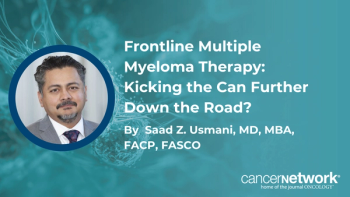
Axi-cel Shows Favorable Responses, But Late NRM in Large B-cell Lymphoma
Reduction of long-term survival following CAR T-cell therapy associated with late infections and SMN development was observed, especially in elderly patients.
Axicabtagene ciloleucel (axi-cel; Yescarta) exhibited sustained, durable responses, but late infections and subsequent malignant neoplasms (SMNs) at the 5-year time point in patients with large B-cell lymphoma, according to findings from an extended follow-up study published in the Journal of Clinical Oncology.
Results from the study show 5-year progression-free survival (PFS) and overall survival (OS) rates of 28.5% (95% CI, 23.0%-34.2%) and 40.3% (95% CI, 34.2%-46.4%), respectively, for axi-cel infused patients. The median PFS was 8.7 months (95% CI, 5.9-16.6) and the median OS was 34.9 months (95% CI, 23.4-44.8) at a median follow-up of 58 months from infusion (range, 0.16-68.7).
Furthermore, the 5-year lymphoma specific survival rate was 53% and the 5-year nonrelapse mortality (NRM) rate was 16.2%, with more than half (n = 21/40) of events occurring after 2 years. Additionally, patients 60 years and older had a higher risk of NRM compared with younger patients (OR, 4.5; 95% CI, 2.1-10.8; P < .001), despite having a lower risk of relapse (P = .02).
“[W]e report a 5-year NRM of 16%, with over half of the NRM events occurring beyond 2 years, mainly caused by infections and SMNs, and concentrated among patients older than 60 years. These data suggest that the care of CAR T-cell therapy survivors should focus on cancer screening, infection prevention, and principles of geriatric oncology,” lead study author Michael D. Jain, MD, PhD, associate member and ICE-T medical director in the Department of Blood and Marrow Transplant and Cellular Immunotherapy at Moffitt Cancer Center in Tampa, Florida, and coinvestigators wrote in the publication.
Leukapheresed- (n = 298) and axi-cel–infused (n = 275) patients with relapsed or refractory large B-cell lymphoma after 2 or more lines of therapy from the US Lymphoma CAR T-cell Consortium were included in the analysis. Follow-up data was collected July 15, 2023, with clinical data collected retrospectively as available.
The overall response rate (ORR) was 82% for the axi-cel cohort, including 64% and 18% of patients attaining complete response (CR) and partial response (PR), as well as stable disease (SD) in 3% and progressive disease (PD) in 14%.
Landmark 1- and 3- year PFS rates were 47.3% (95% CI, 41.3%-53.0%) and 36.1% (95% CI, 30.4%-41.8%), respectively. Among lymphoma progression events (n = 151), 131 occurred within the first year, 13 occurred between years 1 and 2, and 7 occurred after 2 years of axi-cel infusion. Lymphoma progression was identified as late as 46 months, with a 5-year relapse risk of 55.2%.
The 1- and 3-year OS rates at 68.6% (95% CI, 62.8%-73.8%) and 49.1% (95% CI, 42.9%-54.9%), respectively.
Of axi-cel infused patients, 24 (9%) were diagnosed with SMNs. Diagnoses included 15 therapy-related myeloid malignancies: 11 myelodysplastic syndrome instances, 2 instances of acute myeloid lymphoma (AML), and single instances of chronic myelomonocytic leukemia and mast cell leukemia. Additionally, there were single instances of anal, prostate, endometrial, and lung cancer, as well as metastatic Merkel cell carcinoma, mesothelioma, histiocytic sarcoma, B-cell acute lymphoblastic leukemia, and angioimmunoblastic T-cell lymphoma (AITL).
Deaths occurred in 158 of axi-cel patients in the follow-up period, 40 of which were due to NRM events. Cause of death for the NRM events include infection (n = 21), secondary malignancy (n = 9), early CART T-cell–associated toxicity (n = 3), suicide (n = 1), and unknown causes (n = 6). Between patients younger than 60 years and 60 years or older, deaths from active CAR T-cell toxicity (1 vs 2), infection (4 vs 17), secondary malignancy (3 vs 6), and unknown or other (0 vs 7) were higher for the latter, associated with NRM events.
“In summary, 29% of patients with R/R LBCL in our cohort remained alive and in remission at a median of 58 months after standard-of-care infusion with axi-cel. Key survivorship issues in CAR T-cell–treated patients include immune reconstitution, infection, and SMNs. Long-term lymphoma relapse prevention, infection risk management, and cancer screening in this unique population need to be developed,” Jain and study coinvestigators concluded.
Reference
Jain MD, Spiegel JY, Nastoupil LJ, et al. Five-year follow-up of standard-of-care axicabtagene ciloleucel for large B-cell lymphoma: results from the US Lymphoma CAR T Consortium. Published online August 2, 2024. doi:10.1200/JCO.23.02786
Newsletter
Stay up to date on recent advances in the multidisciplinary approach to cancer.






































